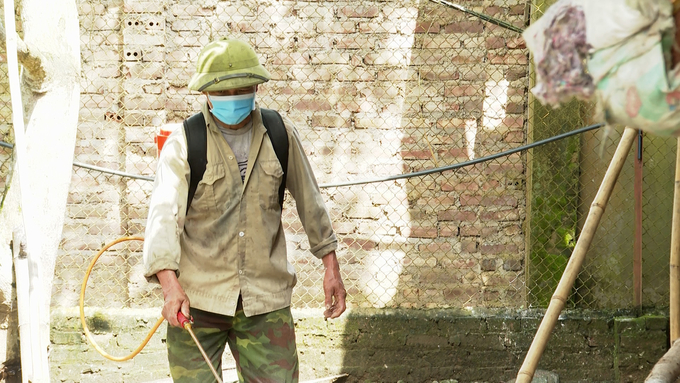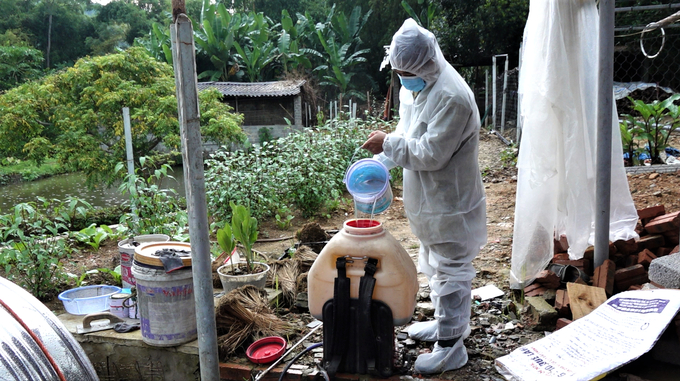June 20, 2025 | 14:14 GMT +7
June 20, 2025 | 14:14 GMT +7
Hotline: 0913.378.918
June 20, 2025 | 14:14 GMT +7
Hotline: 0913.378.918

Na Ri District, Bac Kan is running out of disinfectants for spraying and sanitizing amid the ongoing African swine fever outbreak. Photo: Ngoc Tu.
In Na Ri District, where the African swine fever is present, the entire district has only 248 liters of disinfectants left, which is enough for sanitizing for the next 2 weeks. If the disease spreads to neighboring areas, the demand will increase, potentially depleting the disinfectants immediately, causing disruption to the overall disease prevention.
Mr. Luong Thanh Loc, Vice Chairman of Na Ri District People's Committee, stated that the district can only sanitize the areas with outbreaks and not the surrounding areas under threat of infection, as the disinfectants could run out. To ensure disease prevention, the district will need around 1,000 to 1,500 liters of chemicals in the near future. The local authorities lack the funds to purchase the chemicals and have requested provincial assistance.
Similarly, in Pac Nam District, where African swine fever is also present, there are less than 200 liters of chemicals left. This quantity will only last for a short period, and if not replenished, it will soon run out.
"Currently, Pac Nam District is using the remaining resources conservatively. In the long term, additional chemicals are needed. If the demand for usage increases significantly, it will be difficult to manage and ensure disease prevention," stated Mr. Ma Van Tuan, Vice Chairman of Pac Nam District People's Committee.
While Pac Nam and Na Ri Districts are running out of disinfectants due to outbreaks, other localities within the province also have limited reserves.
Mr. Do Xuan Viet, Head of the Department of Livestock and Veterinary of Bac Kan Province, mentioned that the entire province has only over 1,000 liters of disinfectants left for sanitization. These chemicals have been distributed among districts and cities. If the African swine fever continues to spread or other diseases emerge in livestock, leading to an increase in demand for disinfectants in the near future, the province will run out of disinfectants.
"The bulk of these disinfectants were transferred from 2021 to 2022. In 2022, Bac Kan Province conducted a bidding process to purchase disinfectants and some types of preventive vaccines. However, no enterprises participated in the bidding process, resulting in its cancellation. Until now, in 2023, the entire province has not been able to purchase disinfectants for sanitization," added Mr. Do Xuan Viet for further information.

Due to the lack of enterprises participating in the vaccine and disinfectant bidding process in 2022, Bac Kan Province is currently facing a shortage of disinfectants for spraying and sanitization, causing difficulties in disease prevention and control. Photo: Ngoc Tu.
With only slightly more than 1,000 liters of disinfectants left, Bac Kan Province can temporarily transfer disinfectants from districts without outbreaks to areas with outbreaks to address the urgent situation. However, the quantity available for transfer is limited as other districts also need to retain a portion for contingency.
While unable to purchase new supplies, in 2022, Bac Kan Province received 10,000 liters of Han-Iodine 10% disinfectant chemicals as support from the Ministry of Agriculture and Rural Development's national reserve. These disinfectant chemicals were distributed among districts and cities. Since the beginning of the year, localities have used them up for sanitization. The disinfectant supplies currently in use and in reserve by the districts are leftovers from 2021.
In light of the potential depletion of supplies, Mr. Nong Quang Nhat, Vice Chairman of Bac Kan Province People's Committee, has requested the Department of Agriculture and Rural Development to promptly provide advice to the province for proposing central-level assistance from the national reserve. Additionally, the relevant departments and agencies need to clarify the reasons for the failure to conduct the bidding process for the purchase of disinfectants and certain types of vaccines. This will allow for solutions to be developed to organize procurement bidding in the near future.
At present, Bac Kan is experiencing prolonged rainy and humid weather conditions, which are conducive to the development of disease-causing agents among livestock. Over the past years, it has been evident that diseases frequently spread among livestock during this period. Therefore, supplementing disinfectants for disease prevention is of utmost importance. Furthermore, Bac Kan Province should also have contingency plans in place in case diseases among livestock spread extensively.
Translated by Nguyen Hai Long
![Turning wind and rain into action: [9] Digitizing hydrometeorological data in response to climate change](https://t.ex-cdn.com/nongnghiepmoitruong.vn/608w/files/news/2025/06/17/z6704423696987_15fd32ffc26d590d204d520c9dac6786-nongnghiep-165943.jpg)
(VAN) Farmers have begun accessing hydrometeorological applications to adjust their cropping schedules, aiming to ensure productivity and adapt to climate change.
![Turning wind and rain into action: [8] Real-time salinity detection and early warning technology](https://t.ex-cdn.com/nongnghiepmoitruong.vn/608w/files/news/2025/06/17/z6704423696987_15fd32ffc26d590d204d520c9dac6786-nongnghiep-151127.jpg)
(VAN) Thanks to the integration of modern hydrological-hydraulic models, remote sensing technologies, and artificial intelligence, the accuracy of hydrological forecasting has significantly improved.
![Turning wind and rain into action: [7] Early disaster warnings help marine farmers minimize losses](https://t.ex-cdn.com/nongnghiepmoitruong.vn/608w/files/news/2025/06/17/z6704423696987_15fd32ffc26d590d204d520c9dac6786-nongnghiep-142942.jpg)
(VAN) In recent years, thanks to early disaster warnings and forecasting, marine farmers in Khanh Hoa province have been able to reduce risks and losses, thereby improving production efficiency.
![Turning wind and rain into action: [6] ‘Four on-the-spot’ disaster management software](https://t.ex-cdn.com/nongnghiepmoitruong.vn/608w/files/news/2025/06/17/e5a48259d6a262fc3bb3-nongnghiep-183800.jpg)
(VAN) By simply activating the scenario on the disaster management software, the relevant authorities immediately know how many households need to be evacuated, where to evacuate them to, and by what means of transportation…
![Turning wind and rain into action: [5] Hue applies modern technology in disaster forecasting](https://t.ex-cdn.com/nongnghiepmoitruong.vn/608w/files/news/2025/06/17/z6704423696987_15fd32ffc26d590d204d520c9dac6786-nongnghiep-093938.jpg)
(VAN) In Hue city, modern technology has recently been applied in meteorological and hydrological forecasting and warning, helping to reduce the damage caused by natural disasters.

(VAN) A cutting-edge farming technique being implemented on an experimental ranch in Arizona's Sonoran Desert has already saved a billion gallons of water over five years, according to Civil Eats.

(VAN) Poultry and pig production and the environment can be boosted through enhanced water technology, according to new research.